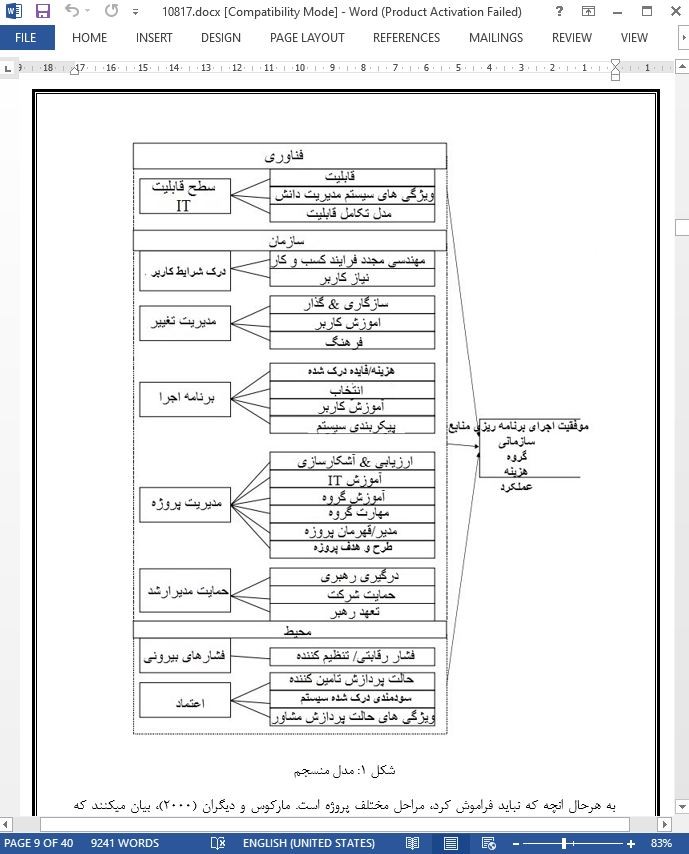
اجرای موفق برنامه ریزی یکپارچه منابع سازمـانی
چکیده
هدف این مقاله ارائه یک مدل مفهومی متشکل از چارچوب فناوری، سازمان و محیط به منظور تعیین بهتر عوامل کلیدی موفقیت در پیاده سازی ERP است. این مقاله همچنین یکی از عوامل کلیدی موفقیت به نام اعتماد به تامین کننده، سیستم و مشاور را که عمدتا پیش از این مورد غفلت واقع شده است، به ادبیات موضوع اضافه میکند. طرح/روش شناسی/ رهیافت- مقاله از ادبیات پیشین و توسعه چهاجوب نظری و مفهومی به منظور نشان دادن یک مدل مفهومی جدید که دربرگیرنده عوامل حیاتی موفقیت ERP، هم در گذشته و هم در بینش جدید است، استفاده میکند تا چگونگی تاثیر اعتماد بر اجرای موفقیت امیز ERP را نشان دهد. یافته ها-مقاله فقدان تحقیقاتی را که نشان دهنده تاثیر اعتماد بر روی اجرای موفق ERP باشد را دریافته و همچنین فقدان مدل مفهومی بهتری که به منظور ایجاد بینشی نسبت به اجرای موفق ERP شکل گرفته باشد را متوجه شد. اصالت/ارزش- مقاله چهارچوب مفهومی کل گرایانهای به منظور اجرای موفق ERP پیشنهاد میدهد و به بحث در مورد تاثیر عامل اعتماد به تامین کننده، سیستم و مشاور در پیاده سازی موفق ERP می پردازد.
مقدمه
سیستم های ERP بسته های نرم افزاری هستند که تعدادی از فرایندهای تجاری مانند تولید، زنجیره تامین، فروش، مالی، منابع انسانی، بودجه بندی و فعالیت های مربوط به خدمات مشتریان را یکپارجه می سازد(Amalnick et al., 2011; Weinrich and Ahmad, 2009). در چند سال گذشته سوال "چه چیز اجرای یک سیستم برنامه ریزی منابع سازمانی(ERP) را موفقیت امیز می کند؟" به شکل وسیعی مورد مطالعه قرار گرفته است. اما تحقیقات اندکی بر روی تاثیر اعتماد بر عرضه کننده، سیستم و مشاور و چگونگی تاثیر ان بر روی اجرای موفق ERP انجام گرفته است. ما نیز همانند محققان پیشین، معتقدیم که ارزیابی ERP باید فراتر از پیشرفت های عملکردی، و به تاثیر راهبردی تر ERP و به ماهیت ناملموس هزینهها و فایدهها در ابعاد سازمانی، تکنولوژیکی و رفتاری BRP بپردازد (Stefanou, 2001).
نتیجه گیری
ادبیات پیشین، توسعه و لیست بلند CSFهای پیاده سازی موفقیت آمیز ERP را نکوهیده و انها را "لیست رختشویی" نامیده اند که فاقد بینشی درباره تاثیر عوامل بر یکدیگر هستند (Akkermans and Van Helden, 2002; Richmond,1993). معتقدیم که تحقیقات آینده باید با استفاده از یک رهیافت کل گرایانه که موفقیت اجرای ERP را تحلیل و آن را از دی تقلیل گرایانه که اجرای ERP را به زیرمجموعه ای از عوامل ناتمام تقلیل میدهند،حفظ می کند، موجب درک بهتری از ERP شوند. مشکلات تقلیل گرایی در CSFهای اجرای ERP توسط وود و کالداس (2001) هم بررسی شده است که توصیه می کنند، اجرای ERP باید به عنوان یک فرایند تغییر بزرگ سازمانی نگریسته شود و نباید با یک دیدگاه تقلیل گرایانه برنامه ریزی و پیاده شود.
Abstract
Purpose The paper aims to present a conceptual model that better defines critical success factors to ERP implementation organized with the technology, organization and environment (TOE) framework. The paper also adds to current literature the critical success factor of trust with the vendor, system and consultant which has largely been ignored in the past. Design/methodology/approach The paper uses past literature and theoretical and conceptual framework development to illustrate a new conceptual model that incorporates critical success factors that have both been empirically tied to ERP implementation success in the past and new insights into how trust impacts ERP implementation success. Findings The paper finds a lack of research depicted in how trust impacts ERP implementation success and likewise a lack of a greater conceptual model organized to provide insight into ERP implementation success. Originality/value The paper proposes a holistic conceptual framework for ERP implementation success and discusses the impact that trust with the vendor, system and consultant has on ERP implementation success.
Introduction
ERP systems are software packages that integrate a number of business processes, such as manufacturing, supply chain, sales, finance, human resources, budgeting and customer service activities (Amalnick et al., 2011; Weinrich and Ahmad, 2009). The question, “what makes implementation of an enterprise resource planning (ERP) system a success?” has been studied extensively in the past few years. Yet little research has been done on the impact of trust with vendors, systems and consultants and how it affects ERP implementation success. We, like other previous researchers, believe that ERP evaluation should extend beyond operational improvements to the more strategic impact of ERP looking at the intangible nature of costs and benefits in organizational, technological and behavioral aspects (Stefanou, 2001).
Conclusion
Past literature has criticized the development and long list of CSFs in ERP implementation research, referring to them as “laundry lists” without insight into how one affects another and vice versa (Akkermans and Van Helden, 2002; Richmond, 1993). We believe that future research should entail a greater understanding of ERP implementations using a holistic approach that analyzes ERP implementation success and refrains from a reductionistic perspective that reduces ERP implementation into a subset of factors that is incomplete. The problems of reductionism in ERP implementation CSFs have also been examined by Wood and Caldas (2001), who recommend ERP implementation should be thought of as a major organizational change process and should not be planned and conducted with a reductionist point of view.

چکیده
مقدمه
پایه های نظری
مدل تکامل قابلیت
نظریه انتخاب راهبردی
نظریه اقتضایی
دیدگاه منابع محور
دیدگاه دانش محور
نظریه سرمایه اجتماعی
پیشگذاره ها
موفقیت اجرای ERP
فناوری
سازمان
مدل یکپارچه
اعتبار مدل مفهومی
محدودیت ها و جهات مطالعات بعدی
نتیجه گیری
Abstract
Introduction
Theoretical foundations
Capability maturity model
Strategic choice theory
Contingency theory
Resource based view
Knowledge based view
Social capital theory
Propositions
ERP implementation success
Technology
Organization
Environment
Integrative model
Validation of the conceptual model
Limitations and future research directions
Conclusion
- اصل مقاله انگلیسی با فرمت ورد (word) با قابلیت ویرایش
- ترجمه فارسی مقاله با فرمت ورد (word) با قابلیت ویرایش، بدون آرم سایت ای ترجمه
- ترجمه فارسی مقاله با فرمت pdf، بدون آرم سایت ای ترجمه
